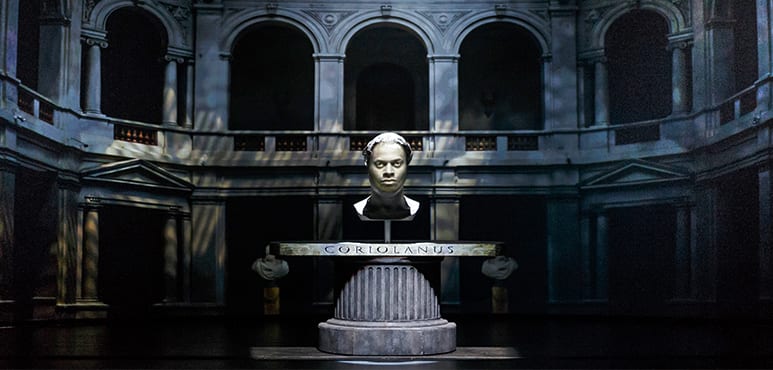One might dub 2018 the year of Robert Lepage. March saw the reprisal of his spectacular production for the Canadian Opera Company, The Nightingale and Other Short Fables. June, the world premiere of Frame by Frame, his visually stunning exploration of the life of Canadian filmmaker Norman McClaren, created for the National Ballet, and in July, his magnificent new production of Shakespeare’s Coriolanus for the Stratford Festival… and we’re only half way through the year!
Lepage’s vision of Shakespeare’s problematic last tragedy does not shy away from the conundrum at the heart of the play— the difficulty of identifying what brings this roaring hero to an entirely pointless end. Is it the state? The adoration and subsequent vilification of the hero by a fickle populace? The hero himself? This knot at the heart of the play is perhaps best articulated in the musings of Aufidius, Coriolanus’s worthy opponent, who notes that the general has provoked all these elements both prodigiously for and violently against himself:
…but one of these—
(As he hath spices of them all, not all,
For I dare so far free him) made him fear’d,
So hated, and so banish’d; but he has a merit,
To choke it in the utt’rance. (IV.vii.45-49)
Coriolanus may be feared, and thus hated and banished, but is this entirely due to his own hamartia, or rather, does this play offer a sobering meditation on the irrational forces of populist political will? Is he a man alternately loved, or hated, by a people, simply because he has been presented either as hero or villain by powers that manipulate public opinion?And so, what do we make of a play where the primary opposing force against the hero rages from the common people?
Lepage translates this question into our times by foregrounding the manner in which social media, and mass media manipulate public opinion—often with disastrous consequences. The play opens in a radio newsroom, where the good citizens of Rome, here cast as news anchors, pundits, and callers, debate the fate of Caius Marcius (not yet Coriolanus), a figurehead of everything that is corrupt within the ruling class, who have denied the starving people access to Rome’s granaries. The people’s will sways madly back and forth, persuaded by any new twist of rhetoric, or should we say, “fake news”?

Lepage’s treatment of the role of media is multifaceted. Moving scrims of projected images both frame the action, and suggest a particular “mediated” way of viewing the world as if through a screen. His envisioning of the battle between the Romans and the Volsciuns as a video game played by a child was a chilling reminder of the vast futility of war, and resonated poignantly against recent headlines coming out of a New York primary, where Alexandria Ocasio-Cortez reminded us that the billions pumped into conflicts could instead ensure the education and future of every young American. Lepage is also able to add in a barb or two at our addiction to devices: at one point two soldiers on opposite sides of a barricade engage in a hilarious exchange via Facebook messenger.
Coriolanus is a play that runs on ensemble. Unlike the other tragedies, the protagonist does not command the audience through monologues that offer insight into the drive and motivation of the hero. The audience is mostly forced to be a helpless spectator—a position that many a citizen with an ounce of political will can relate to, especially after Ontario’s recent provincial election. As was apparent in The Tempest (reviewed in June), there is a distinct robustness in ensemble playing emerging out of Stratford this year. In this production, every performance, even that of Coriolanus’s little son Martius,, was pitch perfect. But there was nothing to prepare the audience for the veritable tornado of maternal (and supremely patriarchal) force that was Volumnia, Coriolanus’s mother, played by an incandescent Lucy Peacock. Peacock’s performance makes one’s hair stand on end; none would expect even the most valliant of heroes to stand up to such a mother. André Sills as Coriolanus, convincingly played the prideful and exacting general. Perhaps missing from his performance, however, was a sense of the character’s absolute mastery of language, of his being a man of words as well as action. Graham Abbey’s Aufidius brought an anguished homoerotic spin to the tension between protagonist and antagonist, thus bringing the play an entirely fresh and relevant direction. Tom McCamus’s stalwart and wily Menenius carried the heart of the play, especially against the machinating tribunes Brutus and Velutus, played to slimy bureaucratic perfection by Stephen Ouimette and Tom Rooney.
To our readers in Canada and around the world, Robert Lepage’s Coriolanus is a rare production you cannot afford to miss this year. This is Shakespeare for our times.

